Papers by Bart A Kamphorst
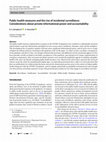
Ethics and Information Technology
The public health measures implemented in response to the COVID-19 pandemic have resulted in a su... more The public health measures implemented in response to the COVID-19 pandemic have resulted in a substantially increased shared reliance on private infrastructure and digital services in areas such as healthcare, education, retail, and the workplace. This development has (i) granted a number of private actors significant (informational) power, and (ii) given rise to a range of digital surveillance practices incidental to the pandemic itself. In this paper, we reflect on these secondary consequences of the pandemic and observe that, even though collateral data disclosure and additional activity monitoring appears to have been generally socially accepted as inevitable consequences of the pandemic, part and parcel of a larger conglomeration of emergency compromises, these increased surveillance practices were not directly justified by appeals to solidarity and public health in the same way that the instigating public health measures were. Based on this observation, and given the increase...
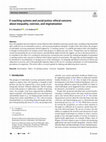
AI and ethics, Feb 19, 2024
Poor self-regulation has been linked to various behaviors that contribute to pressing societal is... more Poor self-regulation has been linked to various behaviors that contribute to pressing societal issues, including rising household debt, inefficient use of sustainable resources, and increasing healthcare demands. In light of this observation, the prospect of individuals receiving automated, tailored support by "e-coaching systems" to scaffold and improve their self-regulation is thought to hold promise for making society-wide progress in addressing such issues. Though there may be legitimate reasons for promoting the use of such systems, and individuals might welcome the support, our aim in the present article is to contribute to the ethics of e-coaching by showing how societal pressures towards the widespread adoption of automated e-coaching systems raise concerns in relation to three distinct aspects of social justice. We argue that societal inequalities may be introduced or exacerbated by (1) unequal access to the technologies, (2) unequally distributed restrictions to liberty and subjection to coercion, and (3) the potentially disparate impact of the use of e-coaching technologies on (self-)stigmatizing perceptions of competence. The article offers a research agenda for studying and addressing these concerns.
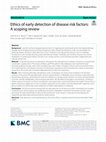
BMC Medical Ethics, 2024
Background. Scientific and technological advancements in mapping and understanding the interrelat... more Background. Scientific and technological advancements in mapping and understanding the interrelated pathways through which biological and environmental exposures affect disease development create new possibilities for detecting disease risk factors. Early detection of such risk factors may help prevent disease onset or moderate the disease course, thereby decreasing associated disease burden, morbidity, and mortality. However, the ethical implications of screening for disease risk factors are unclear and the current literature provides a fragmented and case-by-case picture.
Methods. To identify key ethical considerations arising from the early detection of disease risk factors, we performed a systematic scoping review. The Scopus, Embase, and Philosopher's Index databases were searched for peer-reviewed, academic records, which were included if they were written in English or Dutch and concerned the ethics of (1) early detection of (2) disease risk factors for (3) disease caused by environmental factors or gene-environment interactions. All records were reviewed independently by at least two researchers.
Results. After screening 2034 titles and abstracts, and 112 full papers, 55 articles were included in the thematic synthesis of the results. We identified eight common ethical themes: (1) Reliability and uncertainty in early detection, (2) autonomy, (3) privacy, (4) beneficence and non-maleficence, (5) downstream burdens on others, (6) responsibility, (7) justice, and (8) medicalization and conceptual disruption. We identified several gaps in the literature, including a relative scarcity of research on ethical considerations associated with environmental preventive health interventions, a dearth of practical suggestions on how to address expressed concerns about overestimating health capacities, and a lack of insights into preventing undue attribution of health responsibility to individuals.
Conclusions. The ethical concerns arising with the early detection of risk factors are often interrelated and complex. Comprehensive ethical analyses are needed that are better embedded in normative frameworks and also assess and weigh the expected benefits of early risk factor detection. Such research is necessary for developing and implementing responsible and fair preventive health policies.
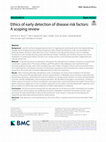
BMC Medical Ethics, 2024
Background
Scientific and technological advancements in mapping and understanding the interrelat... more Background
Scientific and technological advancements in mapping and understanding the interrelated pathways through which biological and environmental exposures affect disease development create new possibilities for detecting disease risk factors. Early detection of such risk factors may help prevent disease onset or moderate the disease course, thereby decreasing associated disease burden, morbidity, and mortality. However, the ethical implications of screening for disease risk factors are unclear and the current literature provides a fragmented and case-by-case picture.
Methods
To identify key ethical considerations arising from the early detection of disease risk factors, we performed a systematic scoping review. The Scopus, Embase, and Philosopher's Index databases were searched for peer-reviewed, academic records, which were included if they were written in English or Dutch and concerned the ethics of (1) early detection of (2) disease risk factors for (3) disease caused by environmental factors or gene-environment interactions. All records were reviewed independently by at least two researchers.
Results
After screening 2034 titles and abstracts, and 112 full papers, 55 articles were included in the thematic synthesis of the results. We identified eight common ethical themes: (1) Reliability and uncertainty in early detection, (2) autonomy, (3) privacy, (4) beneficence and non-maleficence, (5) downstream burdens on others, (6) responsibility, (7) justice, and (8) medicalization and conceptual disruption. We identified several gaps in the literature, including a relative scarcity of research on ethical considerations associated with environmental preventive health interventions, a dearth of practical suggestions on how to address expressed concerns about overestimating health capacities, and a lack of insights into preventing undue attribution of health responsibility to individuals.
Conclusions
The ethical concerns arising with the early detection of risk factors are often interrelated and complex. Comprehensive ethical analyses are needed that are better embedded in normative frameworks and also assess and weigh the expected benefits of early risk factor detection. Such research is necessary for developing and implementing responsible and fair preventive health policies.

AI and Ethics, 2024
Poor self-regulation has been linked to various behaviors that contribute to pressing societal is... more Poor self-regulation has been linked to various behaviors that contribute to pressing societal issues, including rising household debt, inefficient use of sustainable resources, and increasing healthcare demands. In light of this observation, the prospect of individuals receiving automated, tailored support by "e-coaching systems" to scaffold and improve their self-regulation is thought to hold promise for making society-wide progress in addressing such issues. Though there may be legitimate reasons for promoting the use of such systems, and individuals might welcome the support, our aim in the present article is to contribute to the ethics of e-coaching by showing how societal pressures towards the widespread adoption of automated e-coaching systems raise concerns in relation to three distinct aspects of social justice. We argue that societal inequalities may be introduced or exacerbated by (1) unequal access to the technologies, (2) unequally distributed restrictions to liberty and subjection to coercion, and (3) the potentially disparate impact of the use of e-coaching technologies on (self-)stigmatizing perceptions of competence. The article offers a research agenda for studying and addressing these concerns.

Ethics and Information Technology, 2023
The public health measures implemented in response to the COVID-19 pandemic have resulted in a su... more The public health measures implemented in response to the COVID-19 pandemic have resulted in a substantially increased shared reliance on private infrastructure and digital services in areas such as healthcare, education, retail, and the workplace. This development has (i) granted a number of private actors significant (informational) power, and (ii) given rise to a range of digital surveillance practices incidental to the pandemic itself. In this paper, we reflect on these secondary consequences of the pandemic and observe that, even though collateral data disclosure and additional activity monitoring appears to have been generally socially accepted as inevitable consequences of the pandemic, part and parcel of a larger conglomeration of emergency compromises, these increased surveillance practices were not directly justified by appeals to solidarity and public health in the same way that the instigating public health measures were. Based on this observation, and given the increased reliance on private actors for maintaining the digital space, we argue that governments have a duty to (i) seek and ensure that there are justifications for collateral data disclosure and activity monitoring by private actors in the context of (future) public health emergencies like the COVID-19 pandemic, and (ii) regulate and provide accountability mechanisms for and oversight over these private surveillance practices on par with governmental essential services that engage in surveillance activities.

Law, Innovation and Technology
As evidenced during the COVID-19 pandemic, there is a growing reliance on smartphone apps such as... more As evidenced during the COVID-19 pandemic, there is a growing reliance on smartphone apps such as digital contact tracing apps and vaccination passports to respond to and mitigate public health threats. In light of the European Commission's guidance, Member States typically offer such apps on a voluntary, 'opt-in' basis. In this paper, we question the extent to which the individual choice to use these appsand similar future technologiesis indeed a voluntary one. By explicating ethical and legal considerations governing the choice situations surrounding the use of smartphone apps, specifically those related to the negative consequences that declining the use of these apps may have (e.g. loss of opportunities, social exclusion, stigma), we argue that the projected downsides of refusal may in effect limit the liberty to decline for certain subpopulations. To mitigate these concerns, we recommend three categories of approaches that may be employed by governments to safeguard voluntariness.
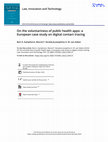
Law, Innovation and Technology, 2023
As evidenced during the COVID-19 pandemic, there is a growing reliance on smartphone apps such as... more As evidenced during the COVID-19 pandemic, there is a growing reliance on smartphone apps such as digital contact tracing apps and vaccination passports to respond to and mitigate public health threats. In light of the European Commission's guidance, Member States typically offer such apps on a voluntary, 'opt-in' basis. In this paper, we question the extent to which the individual choice to use these appsand similar future technologiesis indeed a voluntary one. By explicating ethical and legal considerations governing the choice situations surrounding the use of smartphone apps, specifically those related to the negative consequences that declining the use of these apps may have (e.g. loss of opportunities, social exclusion, stigma), we argue that the projected downsides of refusal may in effect limit the liberty to decline for certain subpopulations. To mitigate these concerns, we recommend three categories of approaches that may be employed by governments to safeguard voluntariness.

PLOS ONE
Introduction Adherence to behavioral measures such as physical distancing are key to mitigating t... more Introduction Adherence to behavioral measures such as physical distancing are key to mitigating the effects of viral pandemics such as the COVID-19 pandemic. Adherence depends in part on people’s perception of what others do (descriptive norms) or approve of (injunctive norms). This study examines the effects that exposure to images depicting people following or breaking physical distancing rules have on perceptions of descriptive and injunctive norms and subsequent adherence behavior. Methods An online between-subjects experiment (n = 315) was conducted, in which participants were exposed to a set of five photographs of different public spaces in which people either did or did not adhere to physical distancing rules (pre-registration: https://www.osf.io/uek2p). Participants’ adherence behavior was measured using a triangulation of measures (incentivized online behavioral task, vignettes, intention measure). Perceptions of relevant social norms were also measured. Results Mann-Whitn...
The argument in favor of a more narrowly construed denition of e-coaching systems formed the basi... more The argument in favor of a more narrowly construed denition of e-coaching systems formed the basis for Kamphorst (2017), "E-Coaching Systems: What They Are, and What They Aren't", published in in a special issue of Personal and Ubiquitous Computing on Supporting a Healthier Lifestyle with e-Coaching Systems, volume 21, issue 4, pp. 625-632. A rst exploration of the relation between personal autonomy and the use of e-coaching systems can be found in Kamphorst & Kalis (2015), "Why option generation matters for the design of autonomous e-coaching systems", in AI & SOCIETY, volume 30, issue 1, pp. 77-88. Finally, elements from the subsection on privacy concerns in Chapter

Personal and Ubiquitous Computing, 2017
The ongoing digitalization and automation of coaching practices is rapidly changing the landscape... more The ongoing digitalization and automation of coaching practices is rapidly changing the landscape of coaching and (health-related) self-improvement. The introduction of a new class of support technologies—"e-coaching systems"—promises to deliver highly personalized, timely, around-the-clock coaching in a wide variety of domains and to a broad audience. At the same time, the introduction of these systems raises a number of practical and ethical concerns regarding, for example, privacy and personal autonomy, that deserve careful consideration. Unfortunately, constructive conversations about these technologies are hindered by the lack of a precise understanding of what constitutes an e-coaching system and how e-coaching systems differ from other types of behavior change interventions. The broad and inclusive definitions that have been offered in the recent literature facilitate a systematic underestimation of the impact that the introduction of e-coaching systems will have, by allowing discussions to include examples of systems with which people are familiar but which lack the level of sophistication and independence needed for a genuine process of coaching. As a consequence, specific concerns that arise with sophisticated, adaptive systems that form their own perspective on a user's health and behavior and from that perspective shape persuasive interactions, remain out of focus. This paper aims to remedy this situation by proposing a more narrowly construed definition of e-coaching systems.

The European health psychologist, 2016
Background: Bedtime procrastination is a highly prevalent antecedent of sleep deprivation (Kroese... more Background: Bedtime procrastination is a highly prevalent antecedent of sleep deprivation (Kroese et al., 2014). In the present research, we aimed to develop a typology of bedtime procrastinators. Method: We conducted in-depth interviews (60-90 minutes) with 14 self-labelled bedtime procrastinators and asked them why they often go to bed late and what kind of activities they engage in while delaying their bedtime. Results: Based on thematic analysis of the data, we first distinguished between “genuine” procrastinators (those who needlessly delay their bedtime, despite expecting to be worse of as a result), and strategic delayers (those who self-label as a procrastinator but, in fact, delay their bedtime in order to achieve intended objectives, such as increased sleep pressure as part of self-medicating for insomnia). Within the group of genuine procrastinators, we further distinguished between mindless procrastination and deliberate procrastination. Mindless bedtime procrastinators ...

The European health psychologist, 2016
Background: Many people get insufficient sleep because they needlessly delay going to bed despite... more Background: Many people get insufficient sleep because they needlessly delay going to bed despite expecting to be worse off as a result (bedtime procrastination; Kroese et al., 2014). Implementation intentions (ii’s) may be a useful strategy for combating bedtime procrastination, but has proven ineffective in previous research (Kroese et al., in prep). We hypothesize that the ineffectiveness can be traced to individuals’ reliance on time-based cues (e.g., “if it’s 11 o’clock, I will go to bed”) when forming ii’s, since these cues will be ineffective whenever bedtime procrastinators “lose track of” the time during immersive activities such as playing video games or watching television. Method: In the present study (N = 46), we investigated whether the effectiveness of ii’s could be improved by adding a nudge (i.e., a subtle change in the environment that cues the desired behavior). Participants in the intervention-condition formed an ii and had lamps installed in their living room th...

Procrastination is a widespread type of self-regulation failure that can have serious negative ef... more Procrastination is a widespread type of self-regulation failure that can have serious negative effects on people's health (e.g., because people delay or omit important health behaviors) and well-being. New "e-coaching" technologies make it possible in principle to offer tailored support to individuals in their efforts to change their self-undermining behavior. In practice, however, such automated support is currently unfeasible because the causal mechanisms behind procrastination are complex and poorly understood. This paper presents a new agent-based model of procrastination that integrates insights from economic models about the dynamics of procrastination with psychological concepts that can help explain the behavior on an individual level. The model is validated by using 5-fold cross validation with simulated annealing to fit and test the parameters on an existing dataset on academic procrastination (n=293). Results show that the agent displays realistic behavior a...

Behavioral sleep medicine, Jan 30, 2018
Bedtime procrastination is a prevalent cause of sleep deprivation, but little is known about why ... more Bedtime procrastination is a prevalent cause of sleep deprivation, but little is known about why people delay their bedtimes. In the present research, we conducted a qualitative study with bedtime procrastinators to classify their self-reported reasons for later-than-intended bedtime. Participants (N = 17) were selected who frequently engaged in bedtime procrastination, but whose sleep was not otherwise affected by diagnosed sleep disorders or shift work. We conducted in-depth, semistructured interviews and used thematic analysis to identify commonly recurring themes in the interviews. Three emerging themes were identified: deliberate procrastination, mindless procrastination, and strategic delay. For the form of procrastination we classified as deliberate procrastination, participants typically reported wilfully delaying their bedtime because they felt they deserved some time for themselves. For the category of mindless procrastination, a paradigmatic aspect was that participants l...

Frontiers in psychology, 2018
is an important predictor of sleep insufficiency in the general population (Kroese et al., 2014b)... more is an important predictor of sleep insufficiency in the general population (Kroese et al., 2014b), but little is known about the determinants of this self-undermining behavior. As the phenomenon has been conceptualized in the literature as a form of self-regulation failure (Kroese et al., 2014a), we hypothesized that people's self-regulatory resources in the evening would be predictive of going to bed later than they intended. Specifically, we examined whether the cumulative effect of resisting desires, a measure of self-regulatory resource depletion (Hofmann et al., 2012b), relates to bedtime procrastination. Participants ( = 218) reported how many desires they had tried to resist during the previous day and the extent of their bedtime procrastination. Results show that people who attempted to resist more desires were more likely to engage in bedtime procrastination, suggesting that people may be less likely to stick to their intended bedtime after a particularly taxing day. Im...
... Intentions by Bart Anthony Kamphorst A thesis submitted in partial fulfillment for the ... De... more ... Intentions by Bart Anthony Kamphorst A thesis submitted in partial fulfillment for the ... Declaration of Authorship I, Bart Anthony Kamphorst, declare that this thesis titled, 'Reducing Procrastina-tion by Scaffolding the Formation of Implementation Intentions' and the work presented ...
Computers in Human Behavior, 2012











Uploads
Papers by Bart A Kamphorst
Methods. To identify key ethical considerations arising from the early detection of disease risk factors, we performed a systematic scoping review. The Scopus, Embase, and Philosopher's Index databases were searched for peer-reviewed, academic records, which were included if they were written in English or Dutch and concerned the ethics of (1) early detection of (2) disease risk factors for (3) disease caused by environmental factors or gene-environment interactions. All records were reviewed independently by at least two researchers.
Results. After screening 2034 titles and abstracts, and 112 full papers, 55 articles were included in the thematic synthesis of the results. We identified eight common ethical themes: (1) Reliability and uncertainty in early detection, (2) autonomy, (3) privacy, (4) beneficence and non-maleficence, (5) downstream burdens on others, (6) responsibility, (7) justice, and (8) medicalization and conceptual disruption. We identified several gaps in the literature, including a relative scarcity of research on ethical considerations associated with environmental preventive health interventions, a dearth of practical suggestions on how to address expressed concerns about overestimating health capacities, and a lack of insights into preventing undue attribution of health responsibility to individuals.
Conclusions. The ethical concerns arising with the early detection of risk factors are often interrelated and complex. Comprehensive ethical analyses are needed that are better embedded in normative frameworks and also assess and weigh the expected benefits of early risk factor detection. Such research is necessary for developing and implementing responsible and fair preventive health policies.
Scientific and technological advancements in mapping and understanding the interrelated pathways through which biological and environmental exposures affect disease development create new possibilities for detecting disease risk factors. Early detection of such risk factors may help prevent disease onset or moderate the disease course, thereby decreasing associated disease burden, morbidity, and mortality. However, the ethical implications of screening for disease risk factors are unclear and the current literature provides a fragmented and case-by-case picture.
Methods
To identify key ethical considerations arising from the early detection of disease risk factors, we performed a systematic scoping review. The Scopus, Embase, and Philosopher's Index databases were searched for peer-reviewed, academic records, which were included if they were written in English or Dutch and concerned the ethics of (1) early detection of (2) disease risk factors for (3) disease caused by environmental factors or gene-environment interactions. All records were reviewed independently by at least two researchers.
Results
After screening 2034 titles and abstracts, and 112 full papers, 55 articles were included in the thematic synthesis of the results. We identified eight common ethical themes: (1) Reliability and uncertainty in early detection, (2) autonomy, (3) privacy, (4) beneficence and non-maleficence, (5) downstream burdens on others, (6) responsibility, (7) justice, and (8) medicalization and conceptual disruption. We identified several gaps in the literature, including a relative scarcity of research on ethical considerations associated with environmental preventive health interventions, a dearth of practical suggestions on how to address expressed concerns about overestimating health capacities, and a lack of insights into preventing undue attribution of health responsibility to individuals.
Conclusions
The ethical concerns arising with the early detection of risk factors are often interrelated and complex. Comprehensive ethical analyses are needed that are better embedded in normative frameworks and also assess and weigh the expected benefits of early risk factor detection. Such research is necessary for developing and implementing responsible and fair preventive health policies.
Methods. To identify key ethical considerations arising from the early detection of disease risk factors, we performed a systematic scoping review. The Scopus, Embase, and Philosopher's Index databases were searched for peer-reviewed, academic records, which were included if they were written in English or Dutch and concerned the ethics of (1) early detection of (2) disease risk factors for (3) disease caused by environmental factors or gene-environment interactions. All records were reviewed independently by at least two researchers.
Results. After screening 2034 titles and abstracts, and 112 full papers, 55 articles were included in the thematic synthesis of the results. We identified eight common ethical themes: (1) Reliability and uncertainty in early detection, (2) autonomy, (3) privacy, (4) beneficence and non-maleficence, (5) downstream burdens on others, (6) responsibility, (7) justice, and (8) medicalization and conceptual disruption. We identified several gaps in the literature, including a relative scarcity of research on ethical considerations associated with environmental preventive health interventions, a dearth of practical suggestions on how to address expressed concerns about overestimating health capacities, and a lack of insights into preventing undue attribution of health responsibility to individuals.
Conclusions. The ethical concerns arising with the early detection of risk factors are often interrelated and complex. Comprehensive ethical analyses are needed that are better embedded in normative frameworks and also assess and weigh the expected benefits of early risk factor detection. Such research is necessary for developing and implementing responsible and fair preventive health policies.
Scientific and technological advancements in mapping and understanding the interrelated pathways through which biological and environmental exposures affect disease development create new possibilities for detecting disease risk factors. Early detection of such risk factors may help prevent disease onset or moderate the disease course, thereby decreasing associated disease burden, morbidity, and mortality. However, the ethical implications of screening for disease risk factors are unclear and the current literature provides a fragmented and case-by-case picture.
Methods
To identify key ethical considerations arising from the early detection of disease risk factors, we performed a systematic scoping review. The Scopus, Embase, and Philosopher's Index databases were searched for peer-reviewed, academic records, which were included if they were written in English or Dutch and concerned the ethics of (1) early detection of (2) disease risk factors for (3) disease caused by environmental factors or gene-environment interactions. All records were reviewed independently by at least two researchers.
Results
After screening 2034 titles and abstracts, and 112 full papers, 55 articles were included in the thematic synthesis of the results. We identified eight common ethical themes: (1) Reliability and uncertainty in early detection, (2) autonomy, (3) privacy, (4) beneficence and non-maleficence, (5) downstream burdens on others, (6) responsibility, (7) justice, and (8) medicalization and conceptual disruption. We identified several gaps in the literature, including a relative scarcity of research on ethical considerations associated with environmental preventive health interventions, a dearth of practical suggestions on how to address expressed concerns about overestimating health capacities, and a lack of insights into preventing undue attribution of health responsibility to individuals.
Conclusions
The ethical concerns arising with the early detection of risk factors are often interrelated and complex. Comprehensive ethical analyses are needed that are better embedded in normative frameworks and also assess and weigh the expected benefits of early risk factor detection. Such research is necessary for developing and implementing responsible and fair preventive health policies.